Booking out of Hong Kong
Updated: 2013-09-27 07:00
By Luis Liu(HK Edition)
|
|||||||
Some say Hong Kong has lost the art of reading - that it's too busy making money. Indeed, the city once teemed with antiquarian bookstores dedicated to the preservation of Chinese culture, but only a few continue the struggle for survival today. Luis Liu writes.
Look around in any city you go, London, New York, Sydney. They're almost the same. The ubiquitous temples dedicated to worshipping consumerism, and acquisition rise up in every direction. In Hong Kong, the signs are everywhere: Gucci, D&G, Cartier, Rolex, Nikon, Samsonite, Mikimoto, iPhone, Armani, Saint Laurent.
Look at Mong Kok: teeming with shoppers and their bags and boxes containing top of the line, brand-name running shoes, watches, jewelry, cosmetics, sports gear, haute couture - each presenting tangible evidence the purchaser has paid homage at the shrine and has acquired the tokens, ostensibly to prove that they are someone of value.
Above it all, the window of a bygone era stares dispassionately down upon the swirling chaos of humanity being swept up in a passion to possess luxury. Sixteen floors above Mong Kok's streets, in an old residential building, ironically named, Good Hope, there's a second-hand bookstore that might be said to carry on in faded hope but that's not so.
The Sun Ar Bookstore. It used to be quite famous. Even today, when one enters the building, squeezes into the tiny elevator and punches 16th floor, the slow ascent will mark a journey to another world.
Mong Kok's literary past
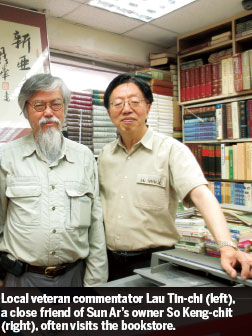
The glass doors open revealing a narrow space of venerable antiquity, even so, an air of nobility. On rows of shelves there are books whose covers have been rubbed raw and whose pages have turned yellow. Hanging on the walls are calligraphies by some celebrities, including famed novelist Shen Congwen.
Sitting at one of the tables reading a book is the owner, Dr So Keng-chit. And no jibes about faded hope apply to him. In all his years in business, his "inner being" hasn't changed much, he says with a smile. He still thinks of himself as the young man, happy to read books day in and day out, waiting for customers to come.
The celebrities whose calligraphies grace the bookstore's walls were friends of his while they lived. Close friends, So reminisces. Shen wrote a poem to him. The inscription holds pride of place in the shop today.
So has been selling used books for a long time. It's a quarter century now since Shen died and So went into business 20 years before that - in 1968, not long after he graduated from university.
"I love reading. I know about business, so becoming a book dealer was logical," he says with a smile.
Back then, Mong Kok - very much in contrast to its present day demeanor - was a center of learning, boasting more than 300 second-hand bookstores, So remembers. It was an era when people wanted to improve their minds - and the bright light of inspiration was more likely to be a good book than, say, a certified diamond, or the dream of getting the latest iPhone several days before any others in one's circle of acquaintance.
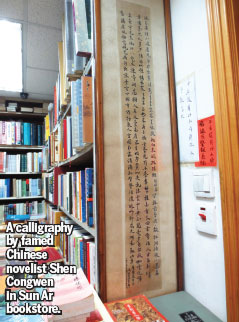
Other than Nelson Street in Mong Kok, there were also Aberdeen Street and Hollywood Road in other parts of Hong Kong. All had reputations based on an abundance of old bookstores. They were called "bookseller streets" and sometimes the shops stood side by side. But Mong Kok was king.
Those were the golden years for Hong Kong's second-hand bookstores - the 60s and 70s. Publishing was shutdown on the mainland during the Cultural Revolution. Everyone living in the "outside world" wanted to know what was going on inside China but the curtains were drawn. The occasional glimpses would come from Hong Kong - and here, in their literary circles, local intellectuals gathered together with experts from overseas libraries and research centers to compare notes about what they were learning behind the curtain. There was great anxiety that many cultural treasures would be lost in the melee.
So's bookstore was in a ground-floor shop on Sai Yee Street. "It was really the peak time," he recalled. "When I began, I was more concerned about how to collect books than about selling them."
He and his fellows sought, with almost feverish dedication, to seize hold of every old literary treasure they could find, so they could preserve them for posterity.
So's "job" was shuttling along the avenues, peering in windows, wandering down dark alleys on the look out for books. He searched in bookstores, pored over landfills. "How to sell them? It was not a problem," So explained. "People would be waiting in line to buy my books. All I have to care about was how to get good books for the readers."
Losing art of reading
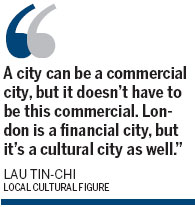
More than 40 years have passed. Second-hand bookstores have become a vanishing species, in the city that seems to have lost the art of reading. Only a couple of the old stores survived. Sun Ar was one. As trade slowed, Sun Ar moved to a second floor apartment and finally to its present location on the 16th floor, where Dr So sits, smiling, with the elegance and wisdom exuding from his old books.
Times have changed from the days when So described books as practically flying off the shelves into the hands of eager buyers. Now, much of his work is trying to impart to others the value of reading and the lessons to be learned.
It's a soldier's battle among the few surviving antiquarian bookstores, every man for himself. But times change, and as Hong Kong develops closer ties with the motherland, there is hope the new generations of Hong Kong young people will turn to books to discover the cultural roots of their people.
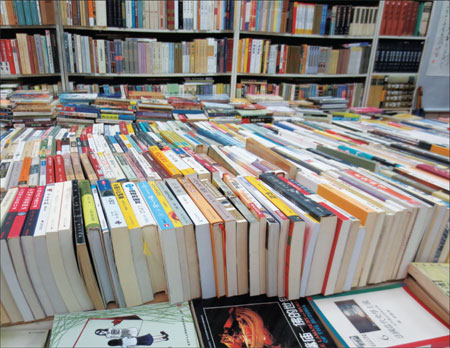
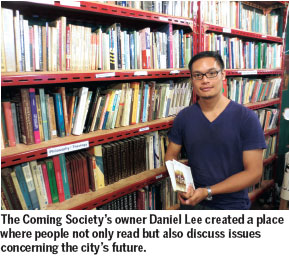

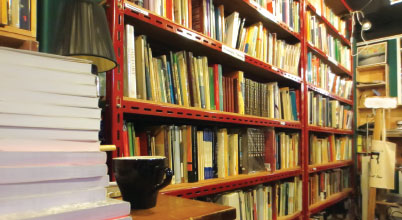
(HK Edition 09/27/2013 page4)